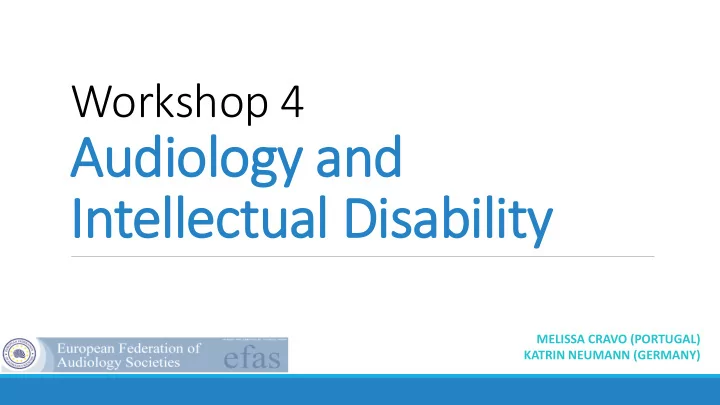

Workshop 4 Audiology and Intellectual Disability MELISSA CRAVO (PORTUGAL) KATRIN NEUMANN (GERMANY)
WG MEMBERS EFAS Working Group on Audiology and Intellectual Disability created in March 2015 . ANDERSSON Eva – Audiologist - Sweden CONINX Frans - Audiologist + Teacher of the Deaf - Germany CRAVO Melissa – Audiologist - Portugal GEORGESCU Madalina - ENT + Audiologist - Romania NEUMANN Katrin – ENT - Germany BRENNAN Siobhan - Audiologist - England WILLEMS Melina - Audiologist + SLP + Deaf Interpreter - Belgium ◦ Global Clinical Advisor - Special Olympics Healthy Hearing EFAS WorkingGroupon on Audiologyand Intellectual Disability 2
WHY? o Ear and hearing problems in people with intellectual disability (ID) are more common than in the general population. o Hearing problems remain undetected, un-served and/or under-treated. o Create awareness to the importance of hearing screening and management for people with ID. o Develop guidelines towards audiological care for people with ID. EFAS WorkingGroupon on Audiologyand Intellectual Disability 3
WHAT HAS BEEN DONE? 1. Literature review: o Definition o Making of a reference list with all relevant literature. Will be very useful information to achieve other goals. 2. Questionnaire: o Gathering information on screening and assessing ear, hearing, vestibular problems in people with an intellectual disability in different European countries by the use of a questionnaire. o Identifying current practices and approaches across Europe o Strong/weak points of implementing 3. Guidelines: o WG decided to develop guidelines instead of protocols. Guidelines can be used on European level, and can be adapted to protocols on National level. EFAS WorkingGroupon on Audiologyand Intellectual Disability 4
INTELLECTUAL DISABILITY Intellectual disability (intellectual developmental disorder) is a disorder with onset during the developmental period that includes both intellectual and adaptive functioning deficits in conceptual, social and practical domains. The following three criteria must be met: ◦ Deficits in intellectual functions, such as reasoning, problem solving, planning, abstract thinking, judgment, academic learning, and learning from experience, confirmed by both clinical assessment and individualized, standardized intelligence testing. ◦ Deficits in adaptive functioning that result in failure to meet developmental and socio cultural standards for personal independence and social responsibility. Without on going support, the adaptive deficits limit functioning in one or more activities of daily life, such as communication, social participation, and independent living, across multiple environments, such as home, school, work, and community. ◦ Onset of intellectual and adaptive deficits during the developmental period. EFAS WorkingGroupon on Audiologyand Intellectual Disability 5
QUESTIONNAIRE General hearing screening Hearing screening programs Need for specific hearing programmes in each for individuals with screenings country intellectual disabilities • Government initiatives for HS • Age • Specific for people with for people with ID down’s syndrome or any form • Government regulation • Government regulation of ID • Modifications for people with • Opportunities/ barriers for • Screening methods ID implementing HS • Government regulation • Specific follow-up for people • Existing guidelines with ID • Follow-up EFAS WorkingGroupon on Audiologyand Intellectual Disability 6
QUESTIONNAIRE o Sent via email (Google forms) to EFAS representatives. o The data was collected between September 2016 and January 2017. o 23 answers received from 22 countries: 9 Austria Greece Slovakia 8 8 7 Belgium Lithuania Slovenia 6 6 Bulgaria Luxembourg Spain 5 5 4 Croatia Norway Sweden 3 2 England Poland The Czech Republic 2 1 1 1 Finland Portugal Turkey 0 Audiologist ENT Audiologist Audiologist Teacher of No answer Germany Serbia & ENT & SLP Deaf EFAS WorkingGroupon on Audiologyand Intellectual Disability 7
QUESTIONNAIRE – general HS ARE SCREENING HEARING SCREENING AVAILABLE PROGRAMMES GOVERNMENT 14 REGULATED? 12 Yes No 10 8 6 12 9 4 6 2 1 0 16 Newborn HS School-age HS Newborn & School-age HS EFAS WorkingGroupon on Audiologyand Intellectual Disability 8
QUESTIONNAIRE – general HS IS THERE A SPECIFIC FOLLOW-UP FOR PEOPLE IS THERE A FOLLOW-UP FOR PEOPLE ARE THERE HS ADJUSTMENTS WITH ID WHEN THEY HAVE FAILED HS? WITH ID WHEN THEY HAVE PASSED HS? FOR PEOPLE WITH ID? Yes No Yes No Yes No 7 10 11 11 12 15 • Adjustments/follow-up mostly related to high risk newborn hearing screening • “ Recommend to go to the appropriate specialists ” • “ Regularly check up for Mb Down ” EFAS WorkingGroupon on Audiologyand Intellectual Disability 9
QUESTIONNAIRE – specific HS ARE THERE SEPARATE HS PROGRAMMES FOR PEOPLE WITH ID? Yes No YES: • Special Olympics • Newborn Hearing Screening protocol 2 No separate programmes for people with ID 20 EFAS WorkingGroupon on Audiologyand Intellectual Disability 10
QUESTIONNAIRE – need for specific HS? DO YOU THINK THAT SPECIFIC HS FOR POTENTIAL BARRIERS TO IMPLEMENTING HS FOR PEOPLE WITH ID INDIVIDUALS WITH ID ARE NECESSARY? Yes No no answer 1 country specific barriers 2 3 not perceived as a problem 1 lack of legislation 3 dispersion of people with ID 1 19 lack of funding 5 lack of organized infrastructure/ logistics 7 No: lack of (trained) audiologists 3 • Considered only newborn hearing screening 0 2 4 6 8 EFAS WorkingGroupon on Audiologyand Intellectual Disability 11
QUESTIONNAIRE – need for specific HS? CURRENT/PAST HS INICIATIVES SPECIFICALLY ARE THERE ANY AUDIOLOGICAL/ENT FOR PEOPLE WITH ID IN YOUR COUNTRY GUIDELINES/PUBLICATIONS IN YOUR COUNTRY Yes No Yes No 6 8 14 16 YES: • Special Olympics EFAS WorkingGroupon on Audiologyand Intellectual Disability 12
SOME CONCLUSIONS o Many countries perform newborn/school-age hearing screening • High risk protocol includes babies with ID o Major focus on newborn/children HS o No reference to adult HS o No specific HS for people with ID however professionals consider it is needed EFAS WorkingGroupon on Audiologyand Intellectual Disability 13
Contact us Melina Willems melina.willems@arteveldehs.be EFAS WorkingGroupon on Audiologyand Intellectual Disability 14
Recommend
More recommend